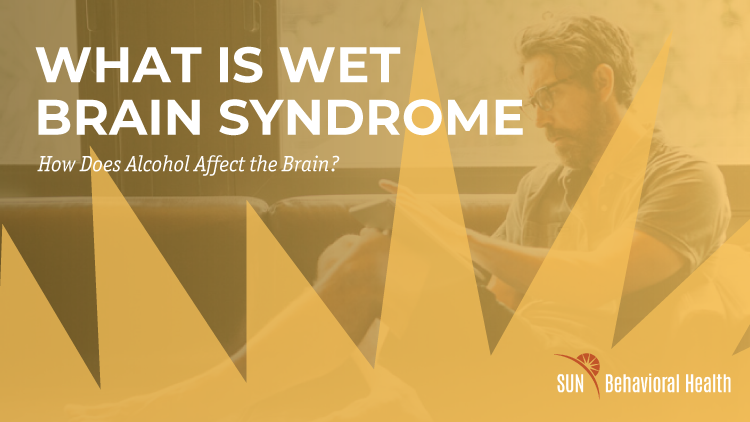Services

After spending a day at a basketball game with your 50-year-old father who has been an alcoholic for as long as you have known him, you drive him home. You ask him how he enjoyed the day together. He calls you Janet, your sister’s name and tells you he enjoyed going to the park today. You remind him that you both attended a basketball game, not the park. He looks at you, confused, and wonders where you came from. He could have sworn that he had visited the park with Janet today. He picks up his beer can in the car’s cup holder and sips it as he looks out the window. You wonder – at 50, could he be getting dementia already?
It is very rare, and you will need a doctor’s opinion, but it is possible that he could have wet brain syndrome. Across the world, wet brain syndrome exists in almost 2% of the world population.
Decreasing your alcohol use to zero can be difficult but necessary to decrease your or someone you love’s chances of developing wet brain syndrome. At Sun Behavioral Delaware, we know how difficult it is for someone to walk away from alcohol to improve their health, but we know that it is possible and that their body and brain will thank them for it later.
Wet brain syndrome is also referred to as Wernicke-Korsakoff syndrome. It is the presence of both Wernicke’s encephalopathy and Korsakoff’s syndrome. Wernicke’s is a disorder where a lack of vitamin B1 causes the decline of the brain due to a decrease of oxygen or blood flow to the brain. At the same time, Korsakoff’s is a memory disorder similar to forms of dementia such as Alzheimers caused by a lack of vitamin B1 and alcoholism. They are not considered different disorders but different levels of severity of the same disorder.
Wernicke’s is the first stage while Korsakoff’s is the last stage. Wernicke-Korsakoff is often associated with symptoms such as confusion and long-term and short-term memory loss. If you have recently been diagnosed with Wernicke-Korsakoff syndrome, you might eventually lose the ability to walk or go into a coma. If it was caught early enough, your doctor might be able to treat it before it gets worse. While an alcohol use disorder is the most common cause of wet brain syndrome, it can also be caused by hemodialysis, anorexia nervosa, AIDs, and cancer.
Alcohol can prevent vitamin B1 from being absorbed by the body. Vitamin B1, also known as thiamine, helps turn food into energy. This energy is then used to power the muscles and nerves controlled by the brain. The constant consumption of alcohol caused by an alcohol use disorder (AUD) can create a lack of this vitamin, eventually leading to wet brain syndrome. Note that while heavy alcohol use can lead to wet brain syndrome, it does not necessarily mean that it will.
Typically, an AUD can be broken up into four stages of alcoholism. Not everyone will experience all of these stages, or there might be other stages that you have experienced. Mostly, people experience a pre-alcoholic stage, early alcoholism stage, middle alcoholism stage, and late alcoholism stage.
Other than wet brain syndrome, you can develop other side effects of alcohol use. Some of these side effects include:
Drinking more than one serving of alcohol in an hour is considered binge drinking. One serving of alcohol is 12 oz of beer, 5 oz of wine, and 1.5 oz of all other alcohol including whiskey, tequila, and rum. Dangers of binge drinking include unintentional injuries to yourself or others, cancer, and cirrhosis. Another danger is alcohol poisoning. Alcohol poisoning is when your body cannot metabolize all of the alcohol in your body. When you drink more than the recommended amount, the alcohol will begin to poison your body and shut down.

Wet brain syndrome is split into two stages: Wernicke’s encephalopathy and Korsakoff’s syndrome. Wernicke’s encephalopathy is the acute stage of wet brain syndrome. It includes symptoms such as loss of mental activity that can lead to coma, loss of muscle coordination, and vision changes. Korsakoff’s syndrome is associated with being unable to form new memories, losing old memories, and creating false memories.
There are two separate stages of wet brain syndrome. The first stage is Wernicke’s encephalopathy, which involves intense brain swelling. This leads to a loss of mental activity. Alcohol prevents vitamin B1 from being processed in the stomach, leading to it not being absorbed by the body and brain. When properly treated, this stage can be reversed.
If it is not properly treated, the second stage called Korsakoff’s syndrome presents itself as a long-term condition that cannot be recovered from when it reaches this point. It has similar symptoms to dementia, such as memory loss and being unable to form new memories.
Most symptoms of Wernicke’s encephalopathy can be reversed with treatment of an increase of vitamin B1 and stopping the use of alcohol. Also, starting a balanced diet can help with the effects of Wernicke’s encephalopathy. However, Korsakoff’s syndrome cannot be improved.
Wet brain syndrome will worsen without proper care, but symptoms can be controlled with proper care, and the disorder’s progression can be slowed or stopped. According to the Alzheimer’s Association, those who get proper treatment recover 25% of the time, while 50% recover some but need assistance, and the remaining 25% don’t recover.
The biggest risk of developing wet brain syndrome is that if left untreated it can develop into the second stage of the disorder, Korsakoff’s syndrome. Because it cannot be reversed, you will experience dementia-like symptoms such as memory loss and confusion. Without treatment, this syndrome will get worse and lead to nerve and brain damage which will eventually lead to death. SUN Behavioral accepts 24/7 admissions for detox so that you can begin your journey to recovering from alcohol use. This will decrease your chances of developing wet brain syndrome.

Stopping your use of alcohol begins with alcohol detox. Detoxing from alcohol takes place during the first 72 hours after your last drink. You will begin to experience symptoms of withdrawal which include:
This is a normal process as it is just your body’s way of removing alcohol from your body. How long these symptoms last for you will depend on factors such as your age, how long you have been drinking, and how much you have been drinking. While the thought of experiencing these symptoms might deter you from starting your recovery from alcohol, know that you don’t have to do it alone. As you detox from alcohol, you can be prescribed anti-nausea and antidepressant medications to help with some symptoms.
At Sun Behavioral Delaware, we understand the importance of having a supportive foundation to give up alcohol for your health successfully. We strive to help you meet your needs by giving you a safe and compassionate environment that will allow you to begin to heal. For more information call us at 302-604-5600 today.
The life expectancy of someone with wet brain syndrome depends on how quickly it is treated. If it is treated early on, you have a chance of recovery. However, if you continue to partake in heavy use of alcohol and don’t get it treated, you will experience long-term effects that will eventually lead to death. At that point, the life expectancy ranges between 5 and 8 years.
The main cause of wet brain syndrome is alcohol use disorder. Consistent use of alcohol can cause the body to no longer absorb vitamin B1 which is the primary reason that wet brain syndrome happens. However, wet brain syndrome can also be caused by hemodialysis, cancer, AIDs, and anorexia nervosa.
Signs of alcoholic dementia can look identical to other forms of dementia. The prevalence of alcohol in your or your loved one’s life is often a contributing factor. This in addition to symptoms such as long-term memory loss and an inability to form new memories might indicate alcoholic dementia. Another symptom of alcoholic dementia is that you make up memories because you can’t remember the real ones. These memories will feel real to you even though they never happened.